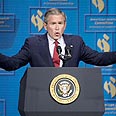
Caution: US to the right
Hawkish American policy may look good now, but it could erode US influence in region
The 'humanitarian era' of the Israeli-Palestinian conflict, in which everyone is discussing aid and welfare and a political process is not to be mentioned, is coming to a close. The current international community's efforts in the Middle East are ostensibly solely aimed at the prevention of a humanitarian crisis in the Palestinian Authority.
Jerusalem, however, seems to be awfully pleased by a particular political achievement – the Americans are demonstrating a consistently obstinate approach toward Hamas. The fact that this position is to the right of Israel's position increases Israeli maneuverability towards Hamas in the international arena.
On the eve the inaugural Prime Minister visit to Washington, Israeli policy makers ought to consider the long term productivity of such an American stance. Indeed, for the moment, the American hard-line makes Israel seem moderate by comparison. However, in the process of devising the next political step vis-à-vis the Palestinians, this hawkish American support, might, in fact limit Israeli policy options.
The three nays
The US has recently devised a policy of “disengagement” vis-à-vis the Palestinians, based on three nays:
Preventing Development and Budgetary Aid. Immediately following Hamas' entry into government, the Americans halted the flow of aid money to the PA and USAID activity was suspended (the organization is now scrutinizing each project to verify it does not support Hamas).
Lately, it has been reported that Israeli officials (ironically) are the ones trying to moderate the American intention to cut off development programs such as the renovation of the sewage system in Hebron.
Outlawing Diplomatic Contacts. Upon formal inauguration of Hamas into the PA government, all branches of the US administration have directed to channel their diplomatic activity to Mahmoud Abbas' office, and refrain from any contact with Hamas elected officials in the PLC and the government. This strategy was incorporated into the Palestinian anti-Terrorism Act of 2006 presented by Congresswoman Ileana Ros-Lehtinen, which includes further prohibitions on Palestinian officials such as banning them from receiving entry visas to the US
Prohibition of Private Commerce. Should the aforementioned bill be ratified, private economic institutions will have to abide by the new policy and freeze official Palestinian bank accounts and financial activity.
It seems as if the Americans are forming a policy that is more extreme than the Israeli one. Ostensibly, an obstinate American position towards Hamas seems to support Israeli efforts to isolate Hamas from the international community. However, the American approach is accompanied by two trends that may prove to be damaging to Israel.
Financial aid can be easily transformed into political leverage. Hence, the retraction of America from the regional arena creates a vacuum that is gradually filled by rogue states like Iran or countries that are seeking to increase their influence on the Middle East like China and Russia. These countries have economic-political interests in the Arab Peninsula (namely oil) and the strengthening ties evolving during the 'humanitarian era' will probably translate into political support for Hamas.
Moreover, America's position forces it to promote its interests in the region through Arab mediators such as Saudi-Arabia and Egypt. This constraint is gradually eroding US prominence in the region. A first indication of that may be found in Egyptian-Saudi ‘recalcitrance’ of Condoleezza Rice's formal request to uphold money transfers to the PA (Dar Al-Hayat, February 23). Theoretically, US foreign aid to Egypt (USD 1.3 billion annually) should provide huge leverage over Egyptian policy, making its refusal to fall in-line especially telling.
Hampering Israel
These trends may hamper Israel as is starts to promote its 'convergence plan'. While the 'Bush-Sharon' letters recognizing disengagement provided international legitimacy for the withdrawal, this time it seems American support will not be enough to rally the international community.
The Europeans, identifying this trend, are also challenging American prominence in the Middle East. The latest occurrence attesting to this trend is the French-led initiative to pressure the US into accepting an alternative funding mechanism to the PA, circumventing Hamas.
Even though the proposed mechanism may serve Israeli interests in the short term, (by preventing the impending collapse of the PA) the fact that it bluntly contradicts previous US stated policy and erodes it's dominance in the Quartet – is far more damaging to Israeli long-term interests in the region.
In addition, one of America's sources of power in promoting Middle East processes derived from its image as "the only one who can bring Israel into the table." Its position to the right of Israel forces Israel to be the one who "brings America to the table."
From the Israeli perspective, the US is by far the most convenient channel to gain international legitimacy. Moreover, the Israeli refusal to discuss with Hamas will, most probably, require a mediator and here, as well, the Americans are Israel's preferred actor.
Considering these trends, Israel should avoid myopic strategies that may erode the relevance of the US for future political scenarios. Therefore, Israel should work to promote understandings with the American administration that are a bit more pliable towards Hamas, in order to prevent the entry of new actors to the political arena. This should be done with the intention of preserving the US prominence as the key actor in the region.
Jonathan Adiri is an Analyst at the Re’ut Institute for Policy Planning










